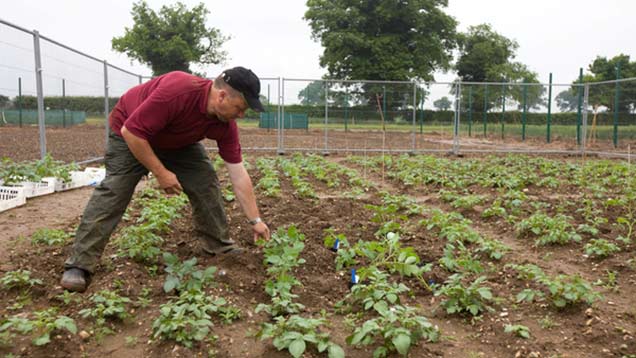Scotland to ban farmers from growing GM crops
 ©Tim Scrivener
©Tim Scrivener Growing genetically modified crops will be banned in Scotland, the Scottish government has announced.
Scotland’s rural affairs secretary Richard Lochhead said he intended to take advantage of new EU rules allowing countries to opt out of growing EU-authorised GM crops.
See also: Report highlights benefits and risks of growing GM crops
The Scottish government will submit a request that Scotland is excluded from any European consents for the cultivation of GM crops.
This would include the MON 810 variety of genetically modified maize already approved and six other GM crops awaiting authorisation, said Mr Lochhead.
“Scotland is known around the world for our beautiful natural environment – and banning growing genetically modified crops will protect and further enhance our clean, green status,” he said.
Mr Lochhead said there was no evidence of significant demand for GM products by Scottish consumers.
“I am concerned that allowing GM crops to be grown in Scotland would damage our clean and green brand, thereby gambling with the future of our £14bn food and drink sector,” he said.
Scottish food and drink was valued at home and abroad for its natural, high quality which often attracted a premium price, Mr Lochhead added.
“I have heard directly from food and drink producers in other countries that are ditching GM because of a consumer backlash,” he said.
“That is why I strongly support the continued application of the precautionary principle in relation to GM crops.”
Mr Lochhead said the Scottish government had long-standing concerns about GM crops.
These concerns were shared by other European countries and consumers, he claimed, and should not be dismissed lightly.
“I firmly believe that GM policy in Scotland should be guided by what’s best for our economy and our own agricultural sector rather than the priorities of others.”
But Huw Jones, professor of molecular genetics at Rothamsted Research, said: “This is a sad day for science and a sad day for Scotland.”
He added: “GM crops approved by the EU are safe for humans, animals and the environment and it’s a shame the Scottish parliament think cultivation would harm their food and drink sector.
“If approved, this decision serves to remove the freedom of Scottish farmers and narrows their choice of crop varieties to cultivate in the future.
European Union rules mean GM crops must be formally authorised by Brussels before they can be cultivated in any EU geographical area.
But an amendment, which came into force earlier this year, allows member states and devolved administrations to restrict or ban the cultivation of GM organisms within their territory.
The amended directive applies to new cultivation dossiers and not GM organisms that have already been or are currently being considered for approval.
Member states wishing to use the transitional arrangements to opt out of growing EU approved GM crops must notify the European Commission by 2 October 2015.

